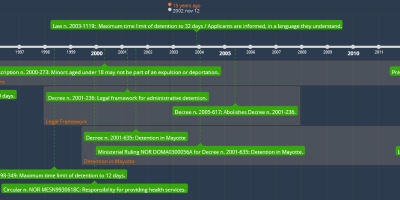mar 1, 2005 - CESEDA: Code of Entry and Residence of Foreigners and of the Right of Asylum.
Description:
L512-1: The court has 72 hours to render its decision. / L523-3 and L523-4 and L523-5: Home detention (Exists in Law and in Practice, 2013). / L531-1 and L531-2: Return of persons into the country of the EU they first entered. Detention pending transfer to another Schengen country. / L551-2: Access to consular assistance and free interpretation services as well as the right to legal counsel (Exists in Law and in Practice, 2011 and 2013). / L551-3: Asylum seekers in detention can benefit from legal and linguistic assistance. It is indicated to the persons held that their asylum application will not be admissible if it is lodged more than 5 calendar days after the notification of their rights read upon arrival, except if the foreign national calls upon new facts occurred after the 5-day deadline has expired. This condition does not apply to asylum seekers from safe countries of origin (Exists in Law and in Practice, 2013). / L552-7: Detention for suspicion of terrorist-related activities.Detention for suspicion of terrorist-related activities. / L552-9 and L552-10: Right to appeal the lawfulness of detention. / L552-11: Right to legal counsel (Exists in Law and in Practice, 2011). / L621-2: Third-country nationals can be subject to criminal penalties in the case of:
- Irregular entry into French territory (maximum penalties: one-year imprisonment, a € 3,750 fine, and three-year re-entry ban into French territory);
- Irregular stay on French territory without a legitimate reason, after they have been subject to a measure of detention or house arrest which ended without the execution of a removal order (maximum penalties: one-year imprisonment, a € 3,750 fine, and one-year re-entry ban into French territory);
- not complying with a refusal of entry or a removal order or returning on French territory after they have been subject to a re-entry ban into French territory (maximum penalties: three-year imprisonment and 10-year re-entry ban into French territory). The decision to prosecute is left to the discretion of the public prosecutor. Prosecutions for irregular entry or stay in the territory are carried out according to the common law procedure, in accordance with the Code of Criminal Procedure. Third-country nationals who irregularly enter the territory may be prosecuted only if they are caught in the act. / L742-4: In cases of detention or house arrest the appeal has to be introduced within 48 hours after the decision of transfer has been notified. / R551-1: Administrative detention will be ordered by the Prefectures of the departments or by the Prefecture of the police in Paris. Detention to effect removal and pending transfer to another Schengen country. Detention for unauthorised entry or stay and to prevent absconding. / R551-4: Foreigner who is subject to a deportation order may contact his or her diplomatic or consular representation. / R552-6: The foreigner is informed of their right to choose a lawyer. The judge can appoint one automatically if the foreigner so requests. / R553-3: Each centre's capacity should not exceed 140 places.
1. A minimum usable surface of 10m² per detainee comprising bedrooms and spaces freely accessible during opening hours;
2. Collective bedrooms (separation men/women) for a maximum of six persons;
3. Sanitary facilities, including wash-hand basins, showers and toilets, freely accessible and of sufficient number, namely one sanitary block for 10 detainees;
4. A telephone for fifty detainees freely accessible;
5. Necessary facilities and premises for catering;
6. Beyond forty persons detained, a recreational and leisure room distinct from the refectory, which is at least 50m², increased by 10m² for fifteen extra detainees;
7. One or several rooms medically equipped, reserved for the medical team;
8. Premises allowing access for visiting families and the consulate authorities;
9. Premises reserved for lawyers;
10. Premises allocated to the OFII, which among others organises voluntary return;
11. Premises, furnished and equipped with a telephone allocated to the NGOs present in the centre;
12. An open-air area; and
13. A luggage room. / R553-11: Foreigners receive a notification of all their rights including the right to apply for asylum and their right to linguistic and legal support in submitting their claim. / R553-13-4: Regulates the access of NGOs to CRAs.
Added to timeline:

Administrative Detention
Research Internship
Date:
